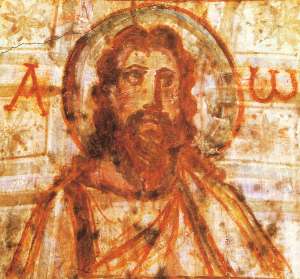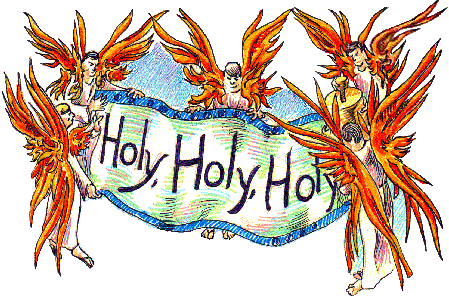1 John 5:7
This is, not a favorite, but a verse the Jehovah's Witnesses love to hate.
It's not in modern Bibles because it's lacking from Greek manuscripts,
inspiring the Watchtower to invent conspiracy scenarios to make Oliver
Stone dizzy. Where did this verse really come from? Was it fabricated by a pope?
It would seem to have been part of the Old African Latin Bible. Tertullian and Cyprian, North African
churchmen, quote this verse as scripture in the third century A.D.:
"The Lord warns, saying, 'He who is not with me is against me, and he who
gathereth not with me scattereth.' He who breaks the peace and the concord of Christ, does so in
opposition to Christ; he who gathereth elsewhere than in the Church, scatters the Church of Christ.
The Lord says, 'I and the Father are one;' and again it is written of the Father, and of the
Son, and of the Holy Spirit, 'And these three are one.' And does any one believe
that this unity which thus comes from the divine strength and coheres in celestial sacraments, can
be divided in the Church, and can be separated by the parting asunder of opposing wills? He who does
not hold this unity does not hold God's law, does not hold the faith of the Father and the Son, does
not hold life and salvation." (Cyprian, Treatise I, On the Unity of the Church, Section 6.)
Given that Cyprian introduces this quote with "it is
written", it is difficult to imagine he's not quoting what, in his mind, is scripture. The
Latin as quoted by Tischendorf is: "Dicit Dominus, Ego et Pater unum sumus (Joann. x. 30); et, iterum,
de Patre, Filio, et Spiritu Sancto, scripture est, Et tres unum sunt."
Another quote from Cyprian:
"If he was sanctified, he also was made the temple of God. I ask, of
what God? If of the Creator; he could not be, because he has not believed in Him. If of
Christ; he could not become His temple, since he denies that Christ is God. If of the Holy
Spirit; since the three are one, how can the Holy Spirit be
at peace with him who is the enemy either of the Son or of the Father?"
(Cyprian, Epistle LXXII To Jabaianus, Concerning the Baptism of Heretics).
Tertullian says, in Against Praxeas,
"Thus the connection of the Father in the Son, and of the Son in the Paraclete,
produces three coherent Persons, who are yet distinct One from Another. These Three are,
one [essence], not one [Person], as it is said, 'I and my Father are One,'
in respect of unity of substance not singularity of
number. [Qui tres unum sunt, non unus, quomodo dictum
est, Ego et Pater unum sumus, etc.]" (Tertullian, Against Praxeas, Chapter XXV.)
Whether this counts as a quote or a random remark must be
determined by context, since modern conveniences like sliced bread and quotation marks were unknown
to the ancients. Personally I think he offers these words, 'tres unum sunt', in the expectation
they'll be accepted as authoritative; i.e., it's a quote of scripture. (The 'essence' and the 'Person'
are the translator's helpful additions to mark the difference between 'unum' and 'unus'.)
(These texts may be found at http://www.ccel.org.)
Where did this text come from, given that it's not found in
our earliest surviving Greek manuscripts? Could it be a marginal note which migrated into the text?
It's easy enough for that to happen, without any ill intent; people of the day wrote notes in the
margin, like we do. They also put corrections in the margin. If, upon proof-reading, the scribe
was found to have skipped a line, that missing line was copied in the margin. So it was easy, the
next time that manuscript was copied, for a note to be mistaken for omitted text.
It's also possible, on the other hand, that these words were
found in the Old African Latin Bible because the translator found them in his Greek copy. Speaking
of 1 John 5:7, R. A. Knox says, "This verse does not occur in any good Greek manuscript. But the
Latin versions may have preserved the true text; scribes often omitted, by error, the former of two
sentences which had deceptively similar endings. In this very chapter, two important
manuscripts omitted the first six words of verse
15, for the same reason." (The New Testament in English, R. A. Knox).
Only a very small sample of early Greek manuscripts have
been preserved, and nobody knows where they came from or who produced them. Heretics are known
to have produced doctored copies of scripture, with material offensive to their cause removed.
Marcion, for example, produced a slimmed-down version of the New Testament, with any suggestion
that Jesus was of Jewish origin struck out. Since it's one of the principles of
modern-day textual criticism that the short version is to be preferred to the long version, heaven help
us all if a copy of Marcion's gospel should turn up -- there goes the New Testament!

|



